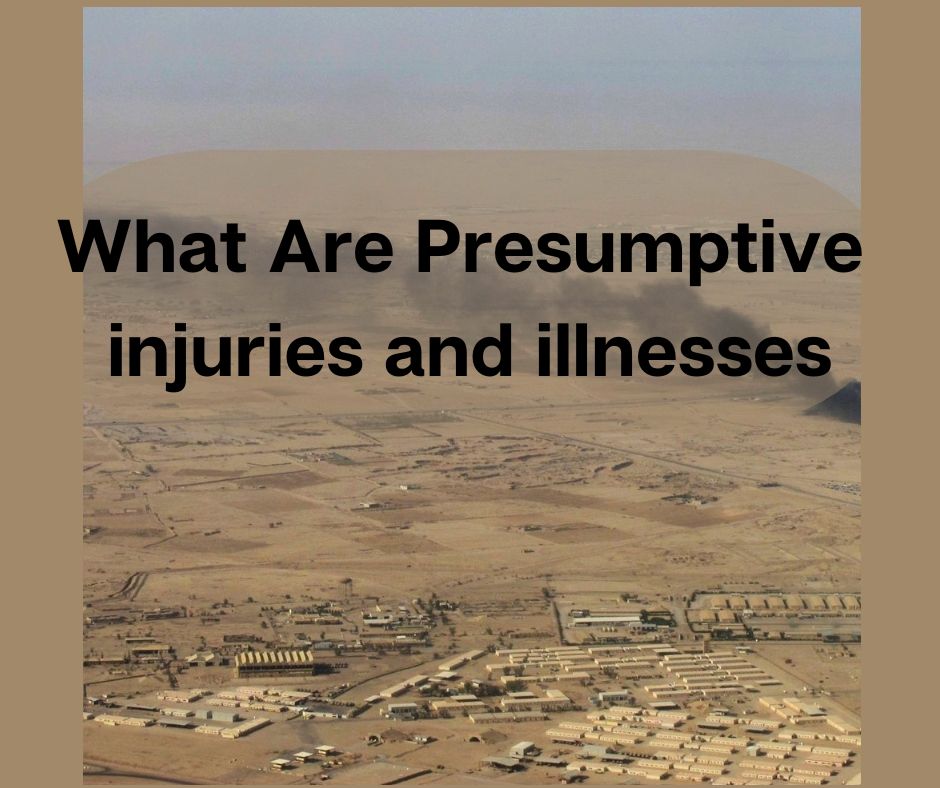Navigating the Landscape of VA Disability: Understanding Presumptive Conditions
We talk about presumptive conditions a lot when dealing with VA disabilities. There are presumptive conditions from being exposed to Agent Orange, from exposure to radiation, and for a long list of countries during the Gulf War era. What does “presumptive” mean and how does this affect Veterans?
Most of the time, in order to file a claim for disability compensation, you must have three things:
- A diagnosis of a medical condition
- An event which occurred while you were in Service
- A way to tie the two together
The first two are the easy parts. Usually, if you are filing for disability compensation, you have already been diagnosed with some medical condition. If you haven’t been diagnosed by a doctor, then you need to see one before you begin your claim.
The event in service is fairy easy usually. It is rare that a veteran is trying to file a claim and doesn’t have some idea of how their time in service affected the condition.
The trouble comes with the third requirement. There must be a way to tie the condition you are currently diagnosed with back to service. Now, if you just got out of the military, or got out just a few years ago, this isn’t too hard. However, if you are a Vietnam Veteran it gets much more difficult to tie your current condition to service 50 years ago.
This is where presumptive conditions come from. There are certain conditions, including several cancers, that the VA has determined to be caused by factors such as exposure to Agent Orange. This decision does away with the need to tie a condition to service. If you are diagnosed with one of the presumptive conditions, all you need is a diagnosis, and proof that you were in an area where you were exposed to the agent.
Agent Orange
Examples of presumptive conditions for veterans who served in the Vietnam War include certain forms of cancer among other conditions. Some of those conditions include:
- Diabetes mellitus type 2
- High blood pressure (hypertension)
- Hypothyroidism
- Ischemic heart disease
- Monoclonal gammopathy of undetermined significance (MGUS)
- Parkinsonism
- Parkinson’s disease

Radiation

Over the past few decades there have been a handful of actions which exposed service members to abnormal amounts of radiation. These include veterans who were exposed to certain gaseous diffusion plants along with veterans who took part in some cleanup operations. Radiation presumptives include:
- All types of cancer (except for certain cancers that the VA has determined are not related to radiation exposure)
- Leukemia (except for chronic lymphocytic leukemia)
- Non-malignant thyroid disease (such as hypothyroidism or hyperthyroidism)
- Parkinson’s disease
- Multiple sclerosis
- Early-onset lupus (systemic lupus erythematosus)
- Certain kidney disorders (such as chronic kidney disease or renal toxicity)
If you are a veteran who was exposed to radiation during your military service and have developed a condition that you believe may be related to that exposure, it’s a good idea to consult with a VA representative or an accredited veterans service organization for guidance on how to file a claim for disability benefits.
Gulf War
Finally we come to the latest source of presumptive conditions. The VA, after exhaustive research and trials, has determined that certain conditions will be presumed to be caused by exposure to toxins known to be present in many of the countries where service members have been deployed while conducting operations in support of the first Gulf War, as well as Operation Iraqi Freedom and Operation Enduring Freedom. Some of these include:

1. Undiagnosed illnesses (also known as “Gulf War Illness”) – This includes a range of symptoms such as fatigue, headaches, joint pain, indigestion, insomnia, dizziness, and memory problems.
2. Chronic fatigue syndrome
3. Fibromyalgia
4. Functional gastrointestinal disorders (such as irritable bowel syndrome)
5. Certain infectious diseases (such as brucellosis, Q fever, and Campylobacter jejuni)
6. Certain neurological conditions (such as Amyotrophic Lateral Sclerosis, or ALS)
7. Respiratory disorders (such as bronchitis, asthma, and chronic obstructive pulmonary disease)
8. Skin conditions (such as chronic disabling dermatitis)
It’s important to note that in order for a Gulf War era veteran’s condition to be considered presumptive due to toxic exposure, they must have served in the Southwest Asia theater of operations during the Gulf War, and their condition must have manifested to a degree of disability within a certain time period after their military service.
If you are a Gulf War era veteran who believes you may have been exposed to toxic substances during your military service and have developed a condition that you think may be related, it’s a good idea to consult with a VA representative or an accredited veterans service organization for guidance on how to file a claim for disability benefits.
Presumptive conditions have been put in place by the VA to make it easier for Veteran to receive compensation. Below are weblinks to the VA pages with lists of presumptive conditions. If you have been diagnosed with any of these conditions and meet the requirements of having been present at one of the locations, talk to a local Veteran Service Officer about filing a claim.
As always, if you have questions or comments you can leave them in the comment section, or send us an email at info@nwavet.org.







